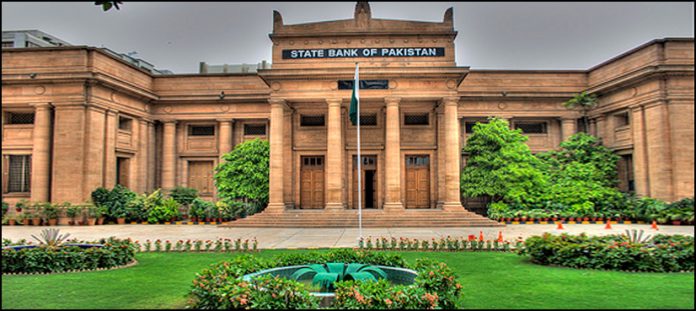KARACHI: State Bank of Pakistan’s (SBP) annual publication Financial Stability Review (FSR) suggests that the level of overall risks to financial stability, as measured by Financial Vulnerability Index, has bottomed out in the calendar year 2017.
However, despite tightening of macro-financial conditions, financial institutions have performed fairly well. The consolidated asset base of the financial sector has expanded by 12.8 per cent during 2017. The asset to GDP ratio has inched up to 74.7 per cent in CY17 from 72.0 per cent in CY16 indicating a higher degree of financial deepening.
The Review presents a performance and risk assessment of various components of the financial sector including banking, non-banking financial institutions, financial markets, exchange companies, non-financial corporates and financial market infrastructure. It also discusses the possible implications of the assessed risks for the overall stability of the financial sector.
On the global front, the review highlights that the pace of global output growth, aided by a rebound in trade and investment, has remained above expectations. The world economy has delivered 3.8 per cent growth in 2017 up from 3.2 per cent in 2016. However, the review notes that short-term risks to global financial stability, after receding in 2017, have risen recently in 2018 due to equity market volatility and trade disputes.
The domestic economy has managed decent growth of 5.37 per cent in FY17 and the momentum has carried on in FY18 with estimated growth of 5.79 per cent. However, the economy is confronted with significant challenges. The foremost being the pressures developing in the external sector because of widening trade deficit followed by fiscal slippages. Headline inflation has been subdued, though core inflation has remained at an elevated level.
The rising macroeconomic vulnerabilities have translated into short-lived volatility in the financial markets (particularly, foreign exchange and equity markets) and impacted the performance of financial institutions.
The report noted that the banking sector has registered an asset expansion of 15.86 per cent largely due to robust growth in advances to private sector. The key thrust in financing demand has come from textile, sugar, cement, and agribusiness sectors. Owing to rise in advances, non-performing loans to advances ratio at 8.4 per cent has touched decade low level and Capital Adequacy Ratio (CAR) at 15.8 per cent is well above the minimum regulatory requirement of 11.275 per cent. Encouragingly, under resilience analysis, banks are expected to absorb shocks in domestic and global stressed scenarios in the medium-term. Nevertheless, declining profitability and deceleration in deposit growth are the key concerns.
The review highlights that Islamic Banks (IBs) and Microfinance Banks (MFBs) are gaining maturity with improved performance, expansion in advances, deposits and customer base and growing share in assets of the financial sector. However, IBs continue to face liquidity management challenges due to the dearth of Shariah-compliant investment instruments, while MFBs may flourish further with enhanced outreach and improvement in financial literacy.
The challenging macro-financial conditions, particularly in H2CY17, have influenced the performance of the Non-Bank Financial Sector as well. Mutual funds have shifted a significant portion towards money market funds in response to volatile equity prices and risk-averse sentiments. However, mutual funds portfolio is still dominated by equities that are exposed to equity price risk. The other non-bank intermediaries like modarabas and leasing companies have been lagging behind in performance due to structural inefficiencies and insufficient availability of low-cost funds.
The limited intermediation role being played by Development Finance Institutions (DFIs) have hindered their growth and adversely impacted their performance during the year. Enabling DFIs to assume their true economic role is a key policy concern. The insurance industry has witnessed a healthy rise in gross premiums but it is exposed to concentration risk due to the dominance of a few insurers. It also faces market risk as adverse movement in interest rates or equity prices may affect its investment income. Exchange Companies (ECs), with steady growth and improving profits during CY17, pose limited systemic risk to the financial system. However, since a few ECs are subsidiaries of banks, the upstream risk, though limited, still exists.
The Financial Market Infrastructures (FMIs) have performed smoothly and efficiently. Pakistan Real-time Interbank Settlement Mechanism (PRISM), a key FMI, has facilitated growing volume and value of wholesale settlement transactions. However, cybersecurity risks remain a key concern for FMIs, particularly for retail transactions, due to the increasing adoption of e-banking channels. Further, rising interconnectedness among the FMIs might lead to contagion risk.
The performance of the non-financial corporate sector has remained upbeat as the estimates suggest broad-based steady growth in assets and decent profitability in CY17. The large listed firms are self-sufficient in liquidity with low debt burdens and strong repayment capacity. However, small listed firms are vulnerable in this perspective. Moreover, the textile sector, being one of the largest borrowers of the banking sector, has relatively high leverage and low repayment capacity.
In the short-term, risks to domestic financial stability may elevate further if external account challenges remain, fiscal imbalances persist, and savings in the economy (especially, deposit growth) stay low. The review suggests that in the medium-term, risks to the financial system may decline in perspective of sustained growth momentum, rising opportunities from CPEC, improving energy availability, and expected increase in exports on the back of improving global demand.
The FSR concludes that SBP, taking a proactive and holistic view of the emerging vulnerabilities, is not only strengthening its own regulatory and supervisory regime but is also collaborating with Securities and Exchange Commission of Pakistan to address the systemic concerns.




